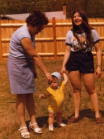Here is information on being the best caregiver you can be
Here is a way for nurses administrators, social workers and other health care professionals to get an easyceu or two

Get your subscription to Activity Director Today's e magazine
There are many patriotic holidays throughout the year. This activity is appropriate for those times, as well as for any time you or they just feel or want to feel patriotic.
You should have a flag or a picture of a flag handy. You can start this activity by reciting the "Pledge of Allegiance." Then you can sing one or two patriotic songs, such as "My Country Tis of Thee'' or "America the Beautiful, Beautiful," with the person or people with dementia.
Now you can have a discussion about the flag. Instead of asking questions, make statements that the dementia participants can complete. Here are some examples.
The colors on the flag are_____,______ and____.
The flag today has_____ stars.
The color of the stars is_____.
The flag has_____stripes.
The colors of the stripes are_____ and______.
There are six____stripes.
There are seven____stripes.
The stripes represent the_____original colonies.
The first flag had____ stars.
I am sure you can think of many more statements. In fact, you can have your participants think of statements about the flag. Then sing the song, "You're a Grand Old Flag."
Now talk about the letters in the word "flag." Mention each letter one at a time. Say, "Lets think of words that start with each letter. If the participant is higher functioning, then have them say a word that starts with a particular letter that is a symbol or a feeling of the flag or patriotism.
For example:
Here are some words that
start with f, flag, friendship, fun, father, future, freedom. Here are some words
that start with l, love, little, land, live, light, leader. Here are some words
that start with a, America
If people are having trouble
thinking of words, give them hints or broaden the categories. You can think of
people’s names that start with each letter in the word flag, for example. Next
sing another patriotic song like, “The Star Spangled Banner”.
Now have a discussion about
the armed forces. Talk about the five branches of the armed forces. See who in
your audience was in the army, navy, air force, marines, or coast guards. You
can sing the theme songs from the different branches of the service during this
part of the discussion. You can talk about the different ranks people can hold
in each of the branches, such as, private, sergeant, captain, or general. See
if any one can name well remembered persons in the service such as General
Patton, General Eisenhower, or General MacArthur, for example. Of course, name
people in the group who were in the armed forces because, after all, they are
famous in your mind. Make sure to thank these people for the service to the
country that they did as well.
Now sing another patriotic
song like “God Bless America
End the activity with another
patriotic song like Yankee Doodle Dandy”. A mixture of discussion alternated with song
works best when trying to keep the interest of everyone involved.










